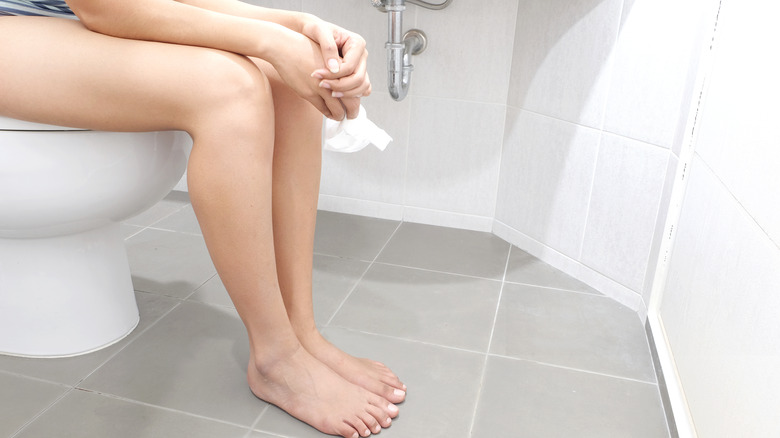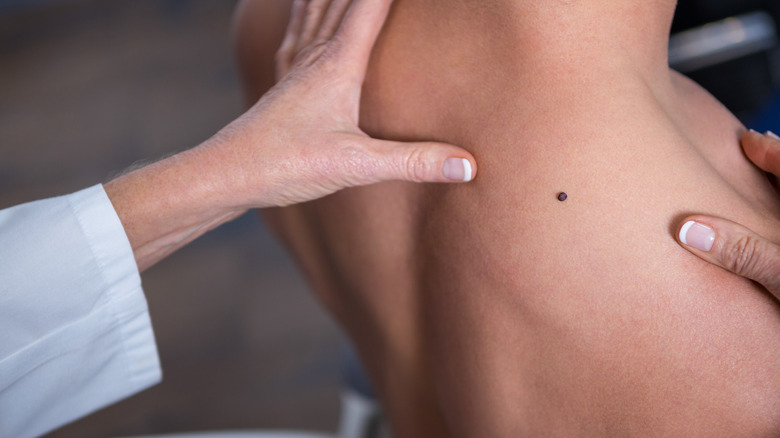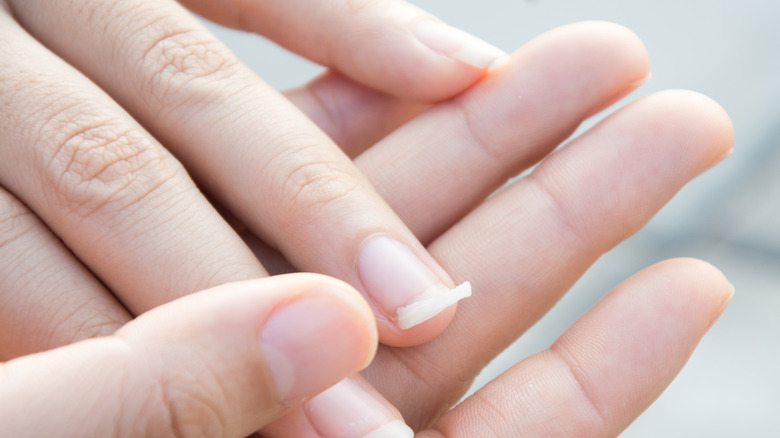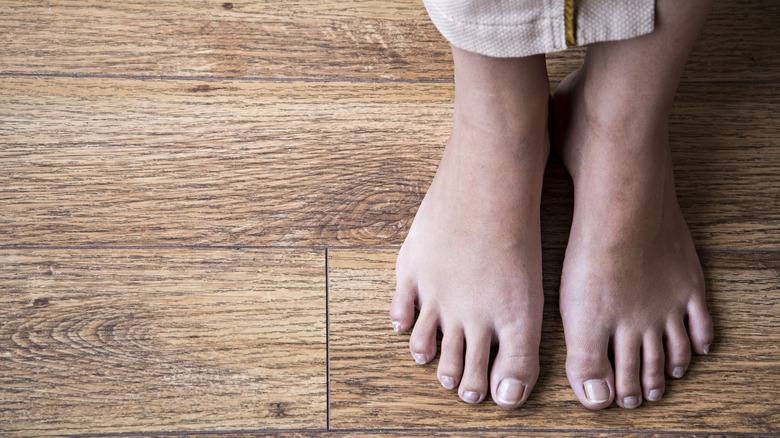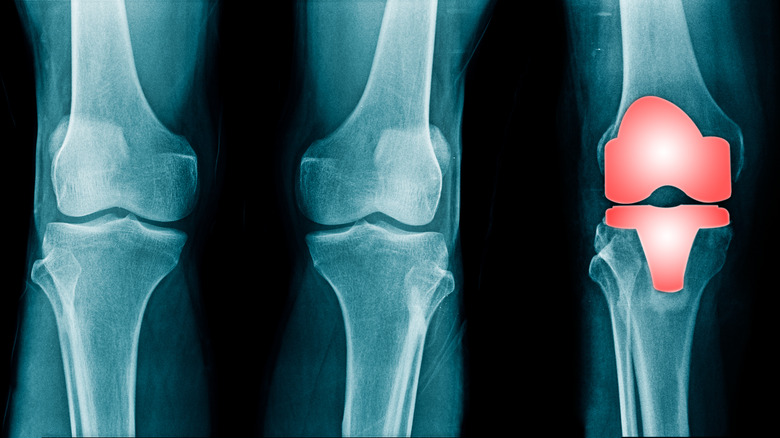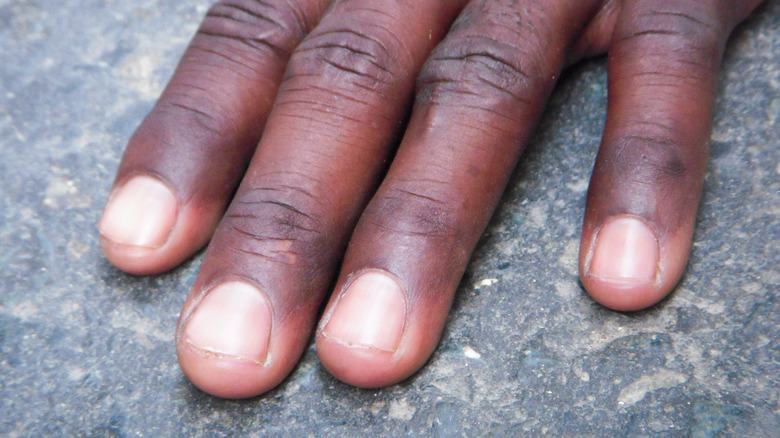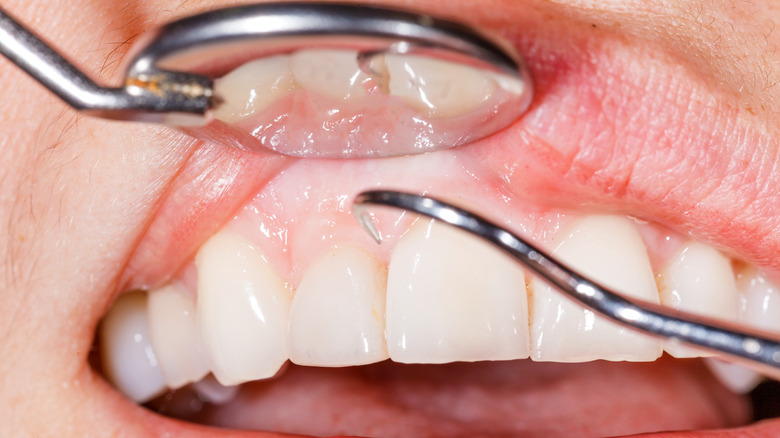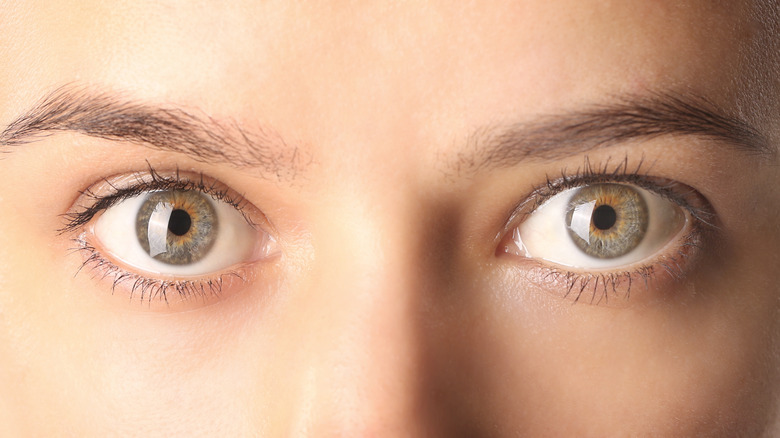Signs From Your Body You Should Never Ignore
We may receive a commission on purchases made from links.
Our bodies are pretty amazing. From hiking mountains, to hauling armfuls of groceries, we rely on these nature-made machines for just about everything, oftentimes without even noticing. But especially in today's fast-paced world, our bodies can't always keep up with our super busy schedules, demanding workloads, and the endless stimulation of on-demand technology. The result: we end up tired, cranky, and ultimately, sick.
Luckily, our bodies are so smart, they usually start letting us know that it's time to slow it down far sooner than we might even notice. The trick is learning how to read those physical cues. That's why I tapped the experts to find out those tell-tale signs from our bodies we should never ignore.
Changes in weight
Maybe you're the type of person who forgets to eat when they're super busy. Or, perhaps you're more like me and a stressful work deadline or unexpected parking ticket is enough to send you to the office vending machine for some therapeutic Cheetos. It may seem harmless enough, but if your coping habits are tipping the scale too far in either direction, it could be a sign of something more serious.
"Unintentional excessive weight loss or weight gain are often signs of mental health issues," NYC therapist Kimberly Hershenson, LMSW, told The List. "Food is sometimes used as an unhealthy coping skill in order to deal with issues of anxiety or depression." So the next time you find yourself elbow deep in the candy jar, take a deep breath and tune in to what your body might really be trying to tell you.
Weight gain or loss can also be a sign of digestive problems such as gastroparesis, or endocrine disorders such as diabetes and thyroid disorders. And because many of these diseases and conditions are serious, any unexplained weight changes merit a trip to the doctor.
Trouble sleeping
According to the CDC, one in three Americans don't get enough sleep at night. And while that's bad news, it's not surprising — it's tough to balance sleep with demands from work, family, and friends. However, for other folks, changes in sleep patterns can be an indicator of other more serious problems.
Skimping on sleep one night to catch up on Game of Thrones is one thing, but Hershenson says that frequent nights spent tossing and turning in bed into the wee hours of the morning could also be a sign of something more serious. "Struggling to get out of bed and sleeping all day or having difficulty sleeping at night these are signs of a mental health issue," she said. And that issue could be depression, anxiety, bipolar disorder, ADHD, or another condition that impacts healthy rest habits.
Besides mental illness, the National Sleep Foundation indicated that trouble sleeping may also be related to asthma, arthritis, and certain endocrine conditions such as hyperthyroidism. The bottom line: if you catch yourself missing out on regular sleep, it may be time to pay a visit to your doctor.
Mood swings
We all get frustrated, but being extra moody or emotional could be a sign of an underlying mental health issue, according to Hershenson. "Fluctuating between happy and sad or lashing out at others for no reason may be indicators of depression," she explained to me. "So is not finding joy in things that used to make you happy."
If you find that you've given up on your hobbies or no longer want to socialize, it may be time to talk to a professional.
Fatigue
Pushing through a single workday when you're feeling tired is tough enough. Dealing with constant fatigue, especially when its seemingly for no apparent reason, can be downright frustrating. According to Dr. Carolyn Dean, a women's health expert and author of The Magnesium Miracle, lack of energy can also be a sign of hormonal imbalances, which, if ignored, can lead to other health issues including heart disease and diabetes.
"You lack energy because your metabolism is slow," she told me. "The thyroid controls metabolism and if thyroid hormones are deficient, then the body slows down. Thus, the symptoms reflect this."
Constipation
Okay, so chances are most of us aren't spending too much time thinking about good ol' number two. We all go — some of us once a day, some of us once a week — and it's all good. No need to pay attention, right? Well, not so much. According to Dr. Dean, our bathroom habits can actually be a big indicator of our overall health. "Slow metabolism leads to slow bowel movement," she told me.
If you're experiencing constipation along with other symptoms like fatigue, muscle cramps or headaches, it could be a sign that your body is lacking some much needed magnesium.
Hair loss
Your hair can also be a big indicator that your metabolism isn't working to its full capacity, Dr. Dean explained, with hair loss and dry hair being the biggest red flags to look for. "Your hair doesn't grow as fast when your circulation is slowed down and doesn't nourish your hair," she said.
Hair loss can also be a sign of stress or that you're using too-harsh shampoos or styling products.
New moles
Spending time outside can be a relaxing way to unwind from life's daily stresses. Unfortunately, the sun's unforgiving rays put us all at risk of developing skin cancer if we're not careful. That's why Dr. Alan J. Parks, dermatologist and founder of DermWarehouse.com, says it's important to know our bodies and be aware of new moles, as well as existing ones that might have changed in color.
"Most worrisome would be a mole getting darker especially black in color," he told The List. "This could be the sign of a malignant melanoma, which is the most deadly form of skin cancer. However, if caught early, the prognosis is excellent.... Moles getting lighter in color could also be a worrisome change as this also could represent a melanoma."
Unexplained rashes
Rashes caused by the sun can also be a sign of something more serious, says Dr. Parks. "Rashes that appear after sun exposure; especially on the face, upper chest, and arms could be a result of medication interacting with the sun, most commonly water pills taken for high blood pressure or NSAID's taken for arthritis or joint pain," he told me. "This type of rash can also be a sign of diseases such as lupus."
Dr. Faisal Tawwab, a physician in Florida, told The List, "A rash appearing on the elbows, knees, back, and or scalp could be a symptom of Celiac disease. The rash, often dismissed as eczema affects 25 percent of all people with Celiac disease, even if they do not have any digestive symptoms."
This reaction is due to an adverse reaction to gluten. Dr. Tawwab continued, "When gluten is consumed, the body releases an antibody called IgA, which attacks the intestines. Sometimes, this antibody gets caught in the blood vessels, causing a rash." He explained that the rash must be biopsied by a doctor for a proper diagnosis.
Brittle nails
Like hair, nails are also a window into our body's state of health. "Nails can reflect signs of skin diseases or internal diseases such as thyroid gland problems," said Dr. Parks. "Any changes in nails, especially if multiple nails are involved, should be checked by a dermatologist. Nail abnormalities can also be a sign of fungus or other type of infections."
Numb feet
Our feet are on the front line of our day-to-day life given that, for most of us, we need our feet to get us where we need to go. So if you ever notice any strange changes in them, you definitely don't want to ignore them. Dr. Suzanne C. Fuchs, a podiatric foot and ankle surgeon, told me, "One subtle sign is numbness in your feet. Numbness in both feet is known as peripheral neuropathy. This is commonly caused by diabetes but could also be a side effect of chemotherapy or even alcoholism."
So if you know you have these other conditions, talk to your doctor about any strangeness in both feet. Additionally, Fuchs continued, "If you have numbness in only one foot this could mean a neuroma or inflammation of a nerve in the foot or due to a pinched nerve higher up in the ankle, leg or back." Even if you just have coldness or pain, see your doctor — there's no reason to live with it either.
Crunchy knees
Our knees are a complex work of art, allowing for an impressive range of motion and capacity for weight. But it's important to be aware of any strange sounds or sensations in your knees as that can be an indication of real problems.
"If you can hear or feel crunching in your knee when you go up stairs or get up from a squat, it is a bad sign, and means the cartilage under your knee cap is wearing out," according to Dr. Barbara Bergin, an orthopedic surgeon. "This most often occurs in women and is the result of a condition called patellar malalignment. Women are predisposed to having this condition because of the way our lower extremities are naturally aligned in order to accommodate our child bearing pelvis."
You also many be prone to this if you do certain exercises. Bering continued, "If you do a lot of squats, box jumping, or stair climbing you might begin to notice this crunching. It might be painless at first, but then it will become painful and cause swelling. This will eventually lead to the development of arthritis in your knee." So be mindful with those knees!
Stubborn pimples
Everyone gets pimples at some point in our lives, as much as we may hate it. Acne is most problematic for teenagers, but women of all ages still get pimples on occasion. And while that's completely normal, having something that looks like a pimple but won't go away is not.
"A pimple that won't go away is often how the most common cancer, Basal Cell Cancer, presents itself," notes Dr. Jennifer T. Haley, a board certified dermatologist. "If you have a 'pimple' that lasts longer than a month, get to a board certified dermatologist for evaluation as it may just be the tip of the iceberg to something extending deeper."
That doesn't mean that you need to freak out about it because it could be a variety of other things, too. But since there is a risk, definitely get it checked out.
Fingernail changes
Your fingernails can tell you a lot more about your health than you likely thought possible. If they're normal and healthy looking, that's a good sign and you have nothing to worry about. But if you notice changes in the color, texture, or strength of your nails, you might want to investigate further what the cause might be.
For example, have your nails flattened, accompanied by concave divots? This is called koilonychia, and can indicate an iron deficiency as well as other issues. Are your nails white with only a narrow band at the top? That could be Terry's Nails, which can be indicative of serious underlying concerns like liver disease and other organ problems. Do you have indented lines across your nails? That might be Beau's Lines, which are associated with a host of ailments from uncontrolled diabetes to vascular disease. So if you notice anything off about your nails, go to your primary care physician and have them examined.
Gum recession
Dental health is much more important than a lot of people know. And it's not just your teeth that you need to take care of, either — your gums also need TLC, often long before you realize it.
Dr. April Patterson, a dentist in South Florida, told me, "You might think it's something you couldn't miss, but gum recession is so gradual and slow that you won't know you have a problem until you do! Gum recession is a silent indicator of periodontal disease, and the endotoxins that cause it have been linked to heart disease as well as diabetes, in some studies." That's pretty serious!
The best way to make sure you don't wind up with unchecked gum recession is by getting regular cleanings at the dentist. Patterson continued, "No matter how much you brush — or how hard — your toothbrush simply can't reach far enough beneath your gums to clean up the accumulation of plaque, calculus, and tartar. So the bacteria will build up and can only be removed with unique instruments designed to go underneath your gums." So getting a cleaning every six months is worth it in the long run.
Conversational changes
Some symptoms are easy to observe in yourself, but there are others that aren't so much, such as mental health. So it's important to be on the lookout for symptoms, which can subtle, in friends or family members.
"Some subtle signs of a beginning psychiatric illness may include a significant and consistent change in the content and tone of an individual's conversation style," according to Dr. Drew Pate, a psychiatrist. "They may begin to frequently speak about things that others have not heard them speak about in the past. For example, they may express concerns that they are being followed or harassed by others or that they are involved in some sort of conspiracy known only to them or a select group." And while this may seem innocuous at times, it can develop into something quite series if ignored.
You also want to be on the lookout for even more subtle shifts. Pate continued, "The tone of their conversation may also change reflecting changes in mood. They may begin to speak much more pessimistically about their lives or their future, or alternatively they may speak in more grandiose or expansive ways about new plans or ideas they have." So if anything seems the least bit off, it's time to check in with a mental health professional.
Eye issues
Human beinsg rely on their eyesight for everything from driving to working and watching screens. And most of the time people don't have to think to much about their eye health — it's taken for granted that seeing won't be a problem. However, eyes are not immune to aging, and are prone to wear and tear just like any other organ. While some symptoms are not of major concern, like thinning eyelashes, other symptoms are.
Are you seeing spots, lines, or floaters? Did you lose peripheral vision? Are you having eye pain, or dryness with burning? Do you have unusual sensitivity to light or glare? If you have any of these, it could be a sign of something more serious.
Pay attention
With so much going on in our day-to-day lives, it's easy to forget to check in with our bodies, making time to notice new lumps and bumps that weren't there before. "Conduct a monthly skin exam on yourself to check for any changing moles or new skin lesions," said Dr. Parks. "If you notice anything abnormal, make an appointment to see your dermatologist."
It's also important to nourish our bodies by slowing things down every now and then. "Doing something just for yourself every day is crucial to alleviating mental stress," said Hershenson. "Whether it's having some tea/coffee while reading the newspaper or stretching for 10 minutes."






